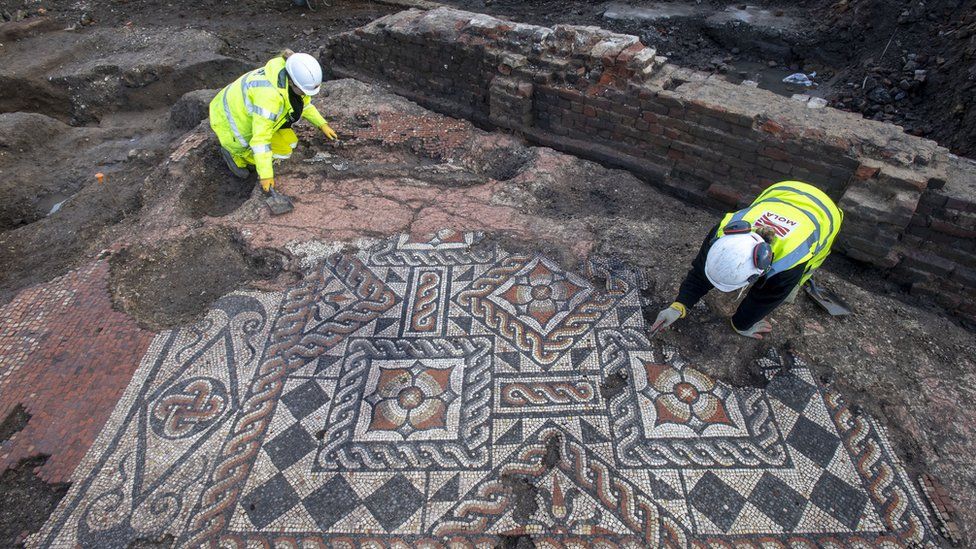
Newsletter
Yes! Send me my FREE short story collection and sign me up for those exclusive subscriber goodies!
We value your privacy, and will never spam you! View our privacy policy at lasmithwriter.com/privacy

Yes! Send me my FREE short story collection and sign me up for those exclusive subscriber goodies!
We value your privacy, and will never spam you! View our privacy policy at lasmithwriter.com/privacy
As the end of my historical fantasy trilogy looms on the horizon, I thought it might be fun to explore some “endings” in 7th-century England, and how they affected those involved. After all, endings can be a time of sorrow, but they can also be a time for new opportunities, right?
The first “ending” I want to look at was the one that set the stage for the so-called Dark Ages to arrive in England. If you’ve read much of my blog, you will know I really don’t like the term Dark Ages, but it is a shorthand that most people understand, so I use it to avoid long explanations.
But to do that, first I have to look at a beginning…
In AD 43 the Emperor Claudius ordered the invasion of Britain, and 20,000 troops landed in Kent. A large army of Britons met them, but the initial two-day battle went Rome’s way. As did the next one, not long after, near the Thames. By the end of that summer, Claudius himself arrived and symbolically led the army to victory in the final mopping-up campaign against the powerful Catuvellauni tribe. Eleven British kings surrendered to Rome in the aftermath and that was pretty much it for an independent Britain. However, it took another 50 years to completely close Rome’s fist around the island, and even then, pieces of the west and north never bowed the knee to Rome.
But for the next three hundred years, until early in the 5th century, Britain was a Roman province, subject to the Emperor. It was not an easy place to rule, what with its famously wet and cold weather and the northern British tribes fomenting beyond Hadrian’s Wall. Others stubbornly refused to capitulate behind the mountainous regions of the west. The Roman army based in Britain were themselves the source of rebellions against the Empire, for as time went on many of them were native-born troops and not so enamoured of Rome’s rule over their countrymen. Twice in the third century, Britain broke away from the Empire for short periods of time under self-styled emperors. But these rebellions didn’t last long and Rome once again gained control.
Rome brought civilization to Britain in a way that hadn’t been there before. Grand spas, expansive Roman-style villas, and urban centres sprang up. Not to mention the marvels of Roman engineering: sewage systems, aqueducts, coins, and perhaps most importantly of all, the marvellous roads that connected the far-flung corners of Britain together and made travel much easier than it had been before. Not only for the conquering army on its marches to and fro, but for the ordinary people as well.

Roman mosaic found in London, UK, Feb. 2022. Image from MOLA/ANDYCHOPPIN
It all changed in AD 400, the year that marks the beginning of the end of Roman Britain. Rome itself was under threat from Alaric the Goth. Stilicho, the commander of the Roman armies in the west, ordered some troops from Britain home to Italy to help in Rome’s defense. Some stayed behind to defend Rome’s garrisons in Britain but they were not enough to adequately defend against the so-called “barbarians” in Britain’s north and west, who, understandably, saw the chance they had been waiting for and harassed the remaining troops mercilessly.
Things weren’t going so well in Italy, either. In AD 407, another call came from Rome for more troops from far-flung regions of the Empire, including Britain. But the army there had had enough. They rebelled and proclaimed one of their generals, Constantine III, as Emperor. Constantine promptly crossed the Channel with his troops and began a campaign to oust the current emperor, Theodosius. An unsuccessful campaign, as it turned out.
Meanwhile, back in Britain, the native tribes successfully fought off a Saxon incursion of their own. And, once they did so, they metaphorically washed their hands of Rome and expelled the Roman administrators from the island, taking charge of whatever Roman troops remained.
However, more Saxons, Angles, and Jutes continued to try their luck at conquest over the fertile soil of Britain, and the native British tribes continued to rebel against the remaining Roman troops. Harassed on all sides, the troops sent a plea to Rome in AD 409 for help. Emperor Honorius sent a note back saying basically, “Not on your life, boyos. You’re on your own.”
And that was that. This effectively ended Rome’s occupation of Britain. Not all vestiges of Roman influence disappeared at once, of course. But the historical record shows that some went away pretty quickly. The date of the last Roman coins in Britain is AD 402. After that, the use of coins disappeared almost right away. This could mean that the ordinary citizens did not use coins much before the Romans left either. It was possible that only the Roman elite class and the troops (who were paid in coins) actually used coinage. Urban centres vanished quickly, too, it seemed. Which, again, could mean that it was only the elite class who lived in towns or cities. The grand villas emptied, and of course, with the lack of taxes, the upkeep of the Roman roads and other infrastructure stopped.
So, things devolved. But one interesting result that I hadn’t thought of before was the strengthening of the Church in post-Roman Britain (and on the Continent in general). As law and order and stability eroded with Rome’s demise, people looked to the Church to provide government, education, health care, etc. This elevated the role of the Church in society to a higher place than it had held before.*
Of course, the removal of Roman rule in Britain left the gates wide open for the entrance of the Angles, Saxons, and Jutes. There continues to be debate as to whether this was a quick invasion or a long migration or some combination of the two. However it happened, a long period of fighting between the Romano-Britons and Anglo-Saxons continued throughout the last half of the 5th century. But in AD 500, the Britons won a decisive victory at the Battle of Mount Badon, significantly halting Anglo-Saxon expansion in Britain for a few decades.
The end of Roman rule in Britain opened up the island to new conquerors and a new way of life. Some of the Romano-British who remained clung more firmly to their Christian faith, as a way of distinguishing themselves from the newcomers to their shores, the Anglo-Saxon pagans. The tribalist, war-band centered Saxons, Angles, and Jutes had a society that was quite similar to the Celtic British who had endured Rome’s rule. Which possibly made for easier integration between the two… but the gods they served and their worldviews were quite different, of course. Although they perhaps understood each other better than the Celts understood the Romans at first, they didn’t necessarily like each other any better!
It’s hard to know how much actually changed for the average peasant after the Romans left. It likely became much more dangerous for tradesmen to hawk their wares if they travelled between settlements and farms, and although the heavy taxation that Rome expected had disappeared, a warlord likely popped up in place of the Roman magistrate, demanding tribute in return for protection from the other raiding and pillaging warlords. Same old, same old, in other words.
The Church became more important in society. Living the life of a monk or nun behind the secure walls of a monastery became perhaps a more appealing prospect. As Rome descended into chaos, the forgotten British Celtic Church continued their work of evangelism, prayer, and care for the outcasts. When Rome once again took notice of Britain in the 6th century and sent St. Augustine over to “evangelize” the Saxons, they discovered the remaining Celtic British Church had not moved on with the times and held to practices Rome had long abandoned. This led to a simmering dispute that was not resolved until a hundred years later.
So, was the end of Roman rule a good thing or a bad thing for Britain? It’s impossible to answer that question, of course, but it certainly changed Britain in a significant way. Recent genetic studies show that the Germanic newcomers didn’t prompt a mass exodus of Romano-British from the island, but rather the populations mingled and intermarried, with the warrior elite imposing new customs and religion that eventually became accepted by the society at large.
It all settled out into a new cultural landscape, with the Anglo-Saxons dominating the central and south of England and the British remnants clinging to their strongholds in the north and west. Some of these remnants held on to the Christian faith that Rome had left behind, some remained pagan Celts until into the 7th century.
And it all changed again when the Vikings arrived in the 8th century, but that’s another story….
*For more on this, see this article
The last book in The Traveller’s Path, a historical fantasy trilogy set in 7th-century England, is coming OCTOBER 31, 2022! Sign up for the newsletter to be kept up to date on the launch. AND, you will get a FREE e-book featuring stories set in the world of The Traveller’s Path.